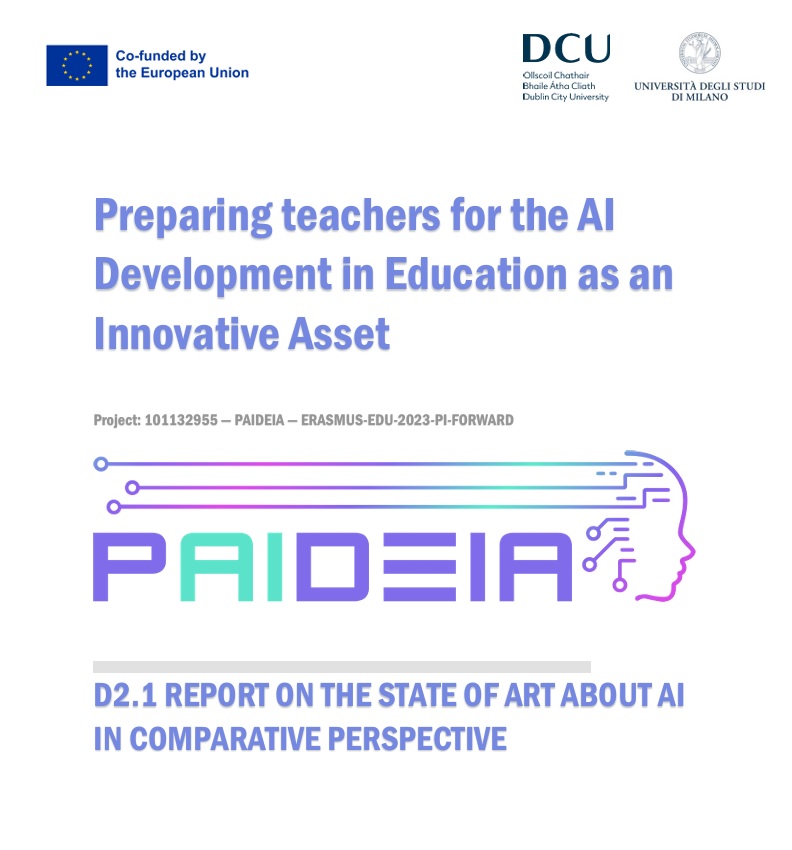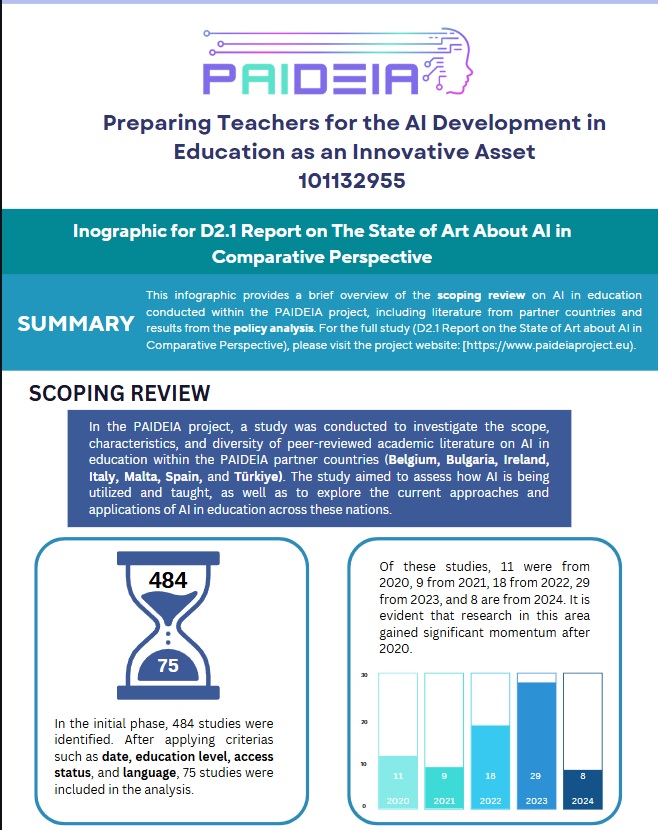
The PAIDEIA Project – PAIDEIA Project, (Preparing teachers for the AI Development in Education as an Innovative Asset) is an EU-funded Erasmus+ Forward Looking research-action project aiming to integrate AI in education by guiding its gradual introduction in schools and with a focus on equipping teachers with tools and knowledge to navigate AI’s potential and risks.
Find selected (with a focus on ‘language’) and summarized[i] content from ‘”Report on The State of Art About AI in Comparative Perspective” PAIDEIA-D2.1-Report_AI.pdf (paideiaproject.eu)
AI and disciplines
Papers in this scoping review referred to AI with regard to a wide range of academic subjects.
Subjects relating to STEM/Science/Mathematics were most frequently cited (22 papers – examples include S73, S15, S57, S54, S21). This was followed by Linguistics/Languages/Language Learning (10 papers).
Subjects that were mentioned three times or fewer include Social Studies, History, Technology, Instructional Technologies/Information Technologies, Art, PE, Geography, Music, Media Literacy, Economics, and Ethics/Religion. Thus it would appear that there is awareness of the implications of AI for a wide range of academic subjects in PAIDEIA partner countries, with a particular emphasis on STEM/Science/Mathematics, Linguistics/Languages/Language Learning, and Computer Science. Of particular note, one paper [S33] outlined a new subject, ‘Introduction to AI’.
AI Usage in Education in PAIDEIA Countries
The findings regarding how AI is being used in education in PAIDEIA countries (Italy, Ireland, Belgium, Spain, Turkey, Bulgaria, Malta) included:
– Data Analysis: 21 papers explored AI/Machine Learning for data analysis, employing methods like artificial neural networks and decision trees.
– Predictive Analytics: Five papers focused on using AI to predict grades, behaviors, or outcomes, such as predicting teacher resilience.
– Independent Learning: Five papers discussed AI’s role in fostering independent learning through personalized education and intelligent tutoring systems.
– Planning and Support: Two papers examined AI for planning educational activities and providing support to enhance student learning.
– Assessment Innovations: Some papers highlighted the use of AI in assessments, such as using ChatGPT for high-stakes examination questions, suggesting a shift towards assessing processes rather than traditional exam formats.
– Teacher Education and Professional Development: Research indicated a need for further professional development for teachers regarding AI in education, emphasizing the importance of integrating AI knowledge into teacher training programs.
– Pedagogical Approaches: Various pedagogical strategies were recommended for teaching AI, including authentic learning experiences, peer collaboration, and integrating theory with practice .
These findings illustrate a growing recognition of AI’s potential in enhancing educational practices and the necessity for educators to adapt to these technological advancements.
AI curriculum
[…]on AI curriculum, a qualitative thematic analysis highlighted the core key features of curriculum design. With regards to curriculum design principles, four papers discussed principles or approaches for AI curriculum design.
Bellas et al. [S08], whose paper presented a proposal for an AI curriculum in high school, alluded to the design of introducing AI content in a progressive manner and taught in a fully practical methodology informed by the concept of intelligent agent.
Fernández-Martínez et al. [S25], whose research explored the operations of an AI workshop in high school, also suggested the need for a practical learning design in the teaching and learning of AI; the authors emphasised how the workshop should be less theoretical and more practical with a focus on application rather than explanation.
Barelli et al. [S05] listed six design objectives for an AI module in secondary schooling: (i) to highlight the relationship between AI and society; (ii) to introduce a number of approaches to AI and programming paradigms; (iii) to scaffold reflections on learning; (iv) to minimise the technological language; (v) to exploit epistemic insights as a way to compare different approaches to AI; and (vi) to connect epistemic insights to operational vocabulary.
Complementing this, Polak et al.’s [S60] research provides six design implications for AI education:
(i) provide the required basics (start with Digital Competence and AI literacy frameworks as AI and digital technologies are continually changing);
(ii) authentic learning experiences should be at the forefront whereby explicit connections are made between AI and real-world materials;
(iii) make the teaching and learning interactive and collaborative (group work, peer learning, interactive learning;
(iv) keep everyone in the loop – address the needs of school management and students alongside the needs of teachers;
(v) make the teaching and learning accessible (particularly if/when teaching about AI on an online platform, as was the case here);
and (vi): motivate the user (the authors linked levels of motivation to levels of digital competencies – by increasing the latter, the former should increase too).
Challenges in AI Implementation Strategies
The implementation of AI in education presents several challenges that need to be addressed for successful integration. Key challenges identified from the contexts include:
– Transparency and Accountability: Many AI algorithms are opaque, making it difficult to understand the reasoning behind AI-based decisions. This lack of explainability can hinder trust among educators and students, as highlighted in the Irish policy which emphasizes the need for transparency in AI systems to build public trust .
– Ethical Considerations: The ethical implications of using AI in education are significant. Teachers must be aware of both the strengths and limitations of AI, as well as the ethical risks involved. The Irish strategy stresses the importance of addressing these ethical considerations in teaching methods .
– Professional Development: There is a need for continuous professional development for teachers to keep pace with technological advancements. The Belgian policy mandates ongoing training to ensure educators are digitally literate and adaptable, but it does not account for the varying capacities of individual educators .
Recommendations for AI in Education
There were a number of recommendations and considerations for the use of AI in education across the included papers.
First, there needs to be greater importance given to issues of AI in schools [S27].
Second, and connected to the first, if more awareness is needed on AI in schools, then teacher education needs to prepare teachers on AI issues; this also involves preparing teachers for the teaching and learning of AI [S27, S36, S69, S08].
Third, students need to develop the digital skills needed to understand and recognise AI (i.e., the risks and benefits of use); digital/AI literacy needs to be taught to students [S27, S55].
Fourth, it is encouraged to use AI to integrate interdisciplinary activities in learning experiences [S27]. Finally, there is a need to develop supporting materials for teachers on main AI concepts which consider educational activities and real-world implementations [S08, S71].

Find more infographic details here
[i] Partly created with PDF questioning functionality on SCISPACE